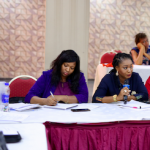In its resolution 1325, “Women, Peace, and Security”, the Security Council of the United Nations for the first time acknowledged that gender matters in peace and security. The resolution, that was adopted in 2000, requires to include women at all stages of a peace process, including peace negotiations. Research suggests that peace agreements are more inclusive and that peace lasts longer when women play lead roles in the negotiations instead of only keeping the minutes. However, we still lack knowledge on the roles that women play when they sit at the negotiation table. The project therefore analyses whether and under what conditions women have voice and influence in peace negotiations. It seeks to identify those factors that allow women to make themselves heard in peace negotiations and those factors that hinder women to do so as well as the strategies that women apply to overcome such barriers. The project therefore draws on interviews with women and men who have actively participated in peace negotiations in the context of armed conflicts around the world. Relevant knowledge is needed in order to design future peace negotiations in ways that allow for an equal participation of women and men and, based thereon, for sustainable peace.
About the author
Andrea Schneiker is Juniorprofessor of Political Science at the University of Siegen. She received her PhD in Political Science from the University of Münster, after which she was Assistant Professor at Leibniz University of Hannover and the University of Bremen. She was also Visiting Scholar at New York University and Radboud University Nijmegen. Her research interests focus on international and transnational governance as well as on peace and conflict studies. She especially investigates the role of non-state actors in peace processes with respect to issues pertaining to gender and violence. She is the author of Humanitarian NGOs, (In)Security and Identity (Routledge 2015) and co-editor (together with Andreas Kruck) of Researching Non-state Actors in International Security (Routledge 2017). Her articles have appeared in, among others, International Studies Review, International Studies Perspectives, Comparative European Politics, Millennium, Security Dialogue, Cambridge Review of International Affairs, Contemporary Security Policy, European Policy, Global Policy.
Within the Gender Seminar Series
The purpose of this seminar is to offer a platform of exchange for students, doctoral students in particular, whose research includes a gender perspective. During this monthly series, students will have the opportunity to discuss their work, meet peers from different disciplines at the Graduate Institute, as well as interact with guest speakers and faculty members.




